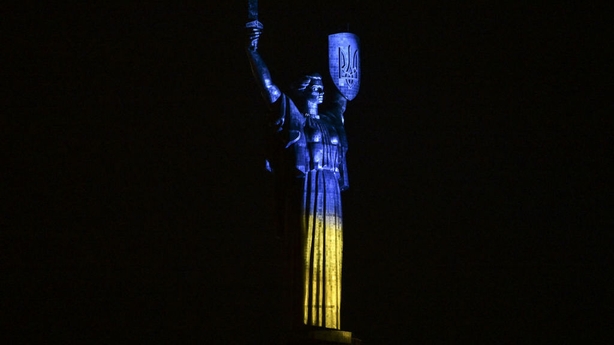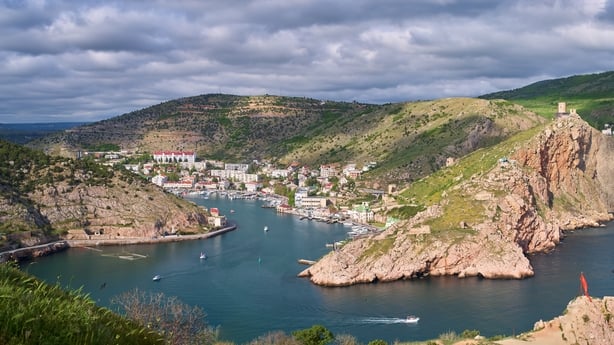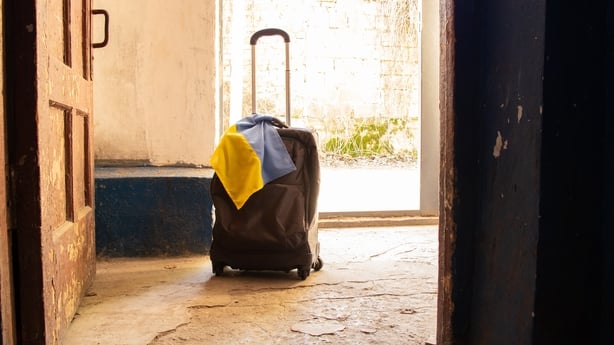Ukrainians at home and around the world have marked their independence day, 32 years after the country split from the former Soviet Union.
"For me, personally, it's the biggest day in the whole year," said Viktoria Pogrebniak, a 28-year-old marketing professional living in Warsaw.
"Nothing is as important as the independence of the territory itself, but also the independence of freedom of choice," said Ms Pogrebniak, a Ukrainian activist with Euromaidan-Warsaw, a civil society group, in the Polish capital.
Euromaidan-Warsaw called on Ukrainians and Poles to mark Ukrainian Independence Day by gathering in Warsaw’s Old Town this evening, and issued awards to Polish volunteers who have helped Ukrainians since the start of Russia’s full-scale invasion last year.
While no mass event took place in the Ukrainian capital Kyiv due to the threat of Russian missile attacks, organisers in Warsaw expected approximately 20,000 people to attend.

Another initiative, entitled Free World Gathering, organised by a broad community of Ukrainian activists and supported by Ukraine’s ministry of foreign affairs, encouraged participants in cities across the globe to form human chains, linking hands as a show of support for Ukraine.
Ukraine's parliament declared independence from the Soviet Union on 24 August 1991, a decision that was backed by 92% of Ukrainian voters in a referendum in December that year.
Days later, the Soviet Union disintegrated.
Myroslava Keryk, President of Ukrainski Dom, a non-governmental organisation which provides cultural and educational services to Ukrainians in Warsaw, told RTÉ News that independence day had always been a happy occasion for her compatriots, but has now taken on greater significance.
"Because of the war, which started in 2014, it’s become much more important for all Ukrainians because it shows how important it is to have freedom," said Ms Keryk, referring to the year that Russia annexed Crimea and began its proxy war in eastern Ukraine.
"Many people have lost their relatives, members of families who are fighting on the frontline. So for them, it's kind of a happy and sad day."

The number of Ukrainian refugees registered in Poland has decreased in recent months, according to the latest data from the United Nations Refugee Agency (UNHCR), from a total of 1.5 million people who were issued with temporary protection at the start of this year, to just under one million people.
Germany, now home to slightly more than one million Ukrainian refugees, has overtaken Poland as the European Union country with the highest number of Ukrainian refugees.
However, the overall number of Ukrainian citizens living in Poland is likely to be much higher as the country was already home to more than 1.2 million Ukrainians, most of whom were issued with temporary work visas, prior to the start of Russia’s invasion.
A large percentage of that pre-war Ukrainian workforce was male, mostly employed in the construction and agricultural sectors. Many returned to Ukraine to serve in the country’s armed forces following Russia’s full-scale invasion of the country in February 2022.
Professor Pawel Kaczmarczyk, director of the University of Warsaw’s Centre for Migration Research, said that the most prominent trait among Ukrainian refugees in Poland is "uncertainty".
"According to our surveys, approximately 30 to 40% of Ukrainians don't know what the future will look like. And, around half of them, would just like to move back to Ukraine as soon as possible," he said.
Between 60% to 70% of Ukrainian refugees living in Poland are employed.
This high level of participation in the Polish labour market was helped, in part, by existing networks of Ukrainians who had worked for Polish firms prior to February 2022.
Demand for foreign workers, which is at a record high in Poland, as well as the ability of many Ukrainians to learn conversational Polish quickly - a language closely related to Ukrainian - have also contributed to such a high participation in the workforce.

In comparison, fewer than one in five Ukrainian refugees were working in Germany, according to a study published last December by Germany's Federal Institute for Population Research.
However, about 40% of Ukrainian refugees employed in Poland are likely to be over-qualified for their roles, said Prof Kaczmarczyk.
Research by the University of Warsaw's Centre for Migration Research also found that approximately 30% of Ukrainian refugees who arrived in Poland after the start of the war continue to work for employers in Ukraine.
Prof Kaczmarczyk terms this group as "digital refugees", such as financial specialists and school teachers, who had to flee their homes because of the war but have been able to continue working remotely from Poland.
Ms Keryk said that it was difficult for many working Ukrainian refugees in Poland "to sustain themselves if they rent a flat", which has encouraged many to live in areas just outside of big cities where rents are cheaper, she said.
Just over 60% of Ukrainian refugees lived in privately rented accommodation, while 15% lived in shared accommodation with Ukrainian family and friends, and Polish families, according a survey earlier this year by the University of Warsaw's Centre for Migration Research.
Between 10% and 12% lived in accommodation paid for by Polish companies, while 6% were living in refugee centres.
Ms Pogrebniak, who moved to Poland nine years ago, plans to stay in Poland.
However, she said that a number of her friends who arrived as refugees would like to return to Ukraine after the war ends.
"Right now, of course, people are going back. They cannot stay longer outside of the country, apart from their families."







